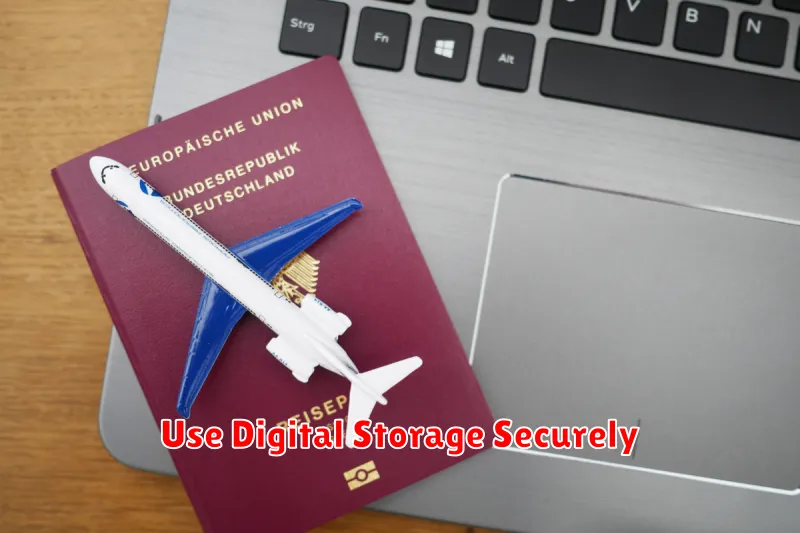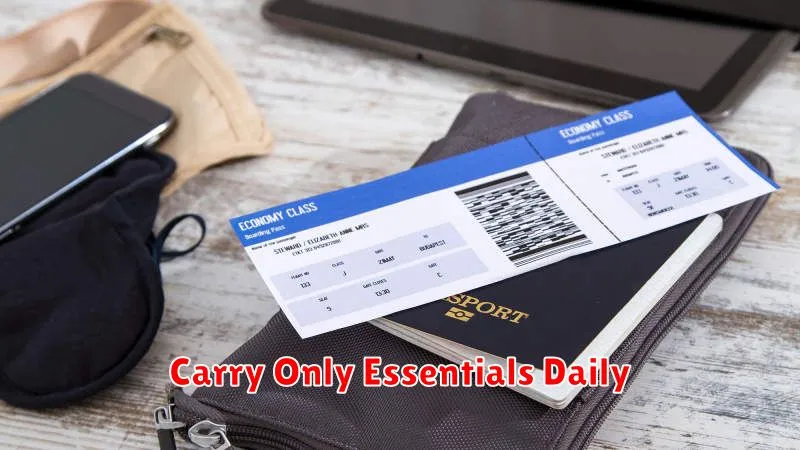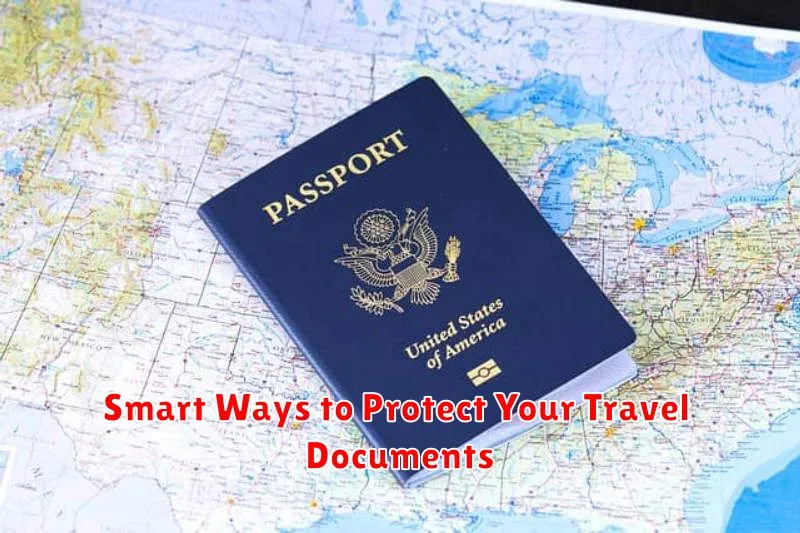Protecting your travel documents is paramount for a smooth and secure trip. Loss or theft of essential documents like your passport, visa, or driver’s license can disrupt your travel plans and lead to significant stress and expense. This article will explore smart ways to safeguard your travel documents, offering practical tips and strategies to ensure peace of mind throughout your journey. From utilizing secure storage solutions to leveraging technology, you’ll learn how to minimize the risk of document loss and protect yourself against potential identity theft.
Whether you’re a seasoned globetrotter or embarking on your first international adventure, understanding the importance of travel document security is crucial. This guide will delve into various methods to protect your important documents, including physical and digital safeguards. We’ll cover everything from choosing the right travel wallet to creating digital copies of your passport and other essential identification. By implementing these smart strategies, you can travel with confidence, knowing that your valuable documents are well-protected.
Why Travel Documents Are Top Targets
Travel documents are highly sought after by criminals for a variety of reasons, making them prime targets. Identity theft is a primary motivator. Passports, driver’s licenses, and visas contain a wealth of personal information that can be used to open fraudulent accounts, apply for loans, or even obtain government benefits. The black market value of these documents is substantial, providing a lucrative incentive for thieves.
Beyond financial gains, stolen travel documents can facilitate illegal immigration and other illicit activities. Criminals may use stolen identities to cross borders undetected or to evade law enforcement. The anonymity afforded by a stolen identity is a powerful tool for those engaged in illegal activities.
Furthermore, the ease of use of some travel documents in certain situations contributes to their appeal to thieves. A stolen passport, for example, might be easier to alter or forge than other forms of identification, enabling criminals to assume a new identity with relative ease. This vulnerability makes them attractive targets for individuals seeking to conceal their true identity.
Make Backup Copies of Everything
Before embarking on your journey, create backup copies of all essential travel documents. This includes your passport, visa, driver’s license, birth certificate, and any other identification cards.
Consider making both physical and digital copies. Physical copies can be stored separately from your originals in a secure location within your luggage. Digital copies can be saved to a secure cloud service or a USB drive. This redundancy ensures access to your information should originals be lost or stolen.
Organize your copies effectively. Clearly label each document and consider using a dedicated folder or digital directory. This will save valuable time and minimize stress if you need to access them unexpectedly. Having readily available copies can greatly expedite the process of replacing lost or stolen documents.
Use Digital Storage Securely

Creating digital copies of your essential travel documents provides a crucial backup in case of loss or theft. Scan your passport, visa, driver’s license, and other important documents. Consider photographing your luggage and its contents as well.
Storing these copies securely is paramount. Avoid using easily accessible platforms like standard email or messaging apps. Instead, opt for encrypted cloud storage services with strong password protection and two-factor authentication. This adds an extra layer of security, making it much harder for unauthorized individuals to access your sensitive information.
Alternatively, consider using a password-protected USB drive. Keep this drive separate from your other belongings, ideally in a secure location like a hotel safe.
Remember, the purpose of digital copies is to have readily available backup documentation, not to carry them around on easily accessible devices while traveling. Minimizing access points to sensitive information is key to safeguarding your identity and travel documents.
Carry Only Essentials Daily

When venturing out daily, whether for work, leisure, or errands, practice carrying only essential documents. Avoid taking your original passport or birth certificate unless absolutely necessary for a specific appointment or transaction.
Consider using photocopies or digital scans of these crucial documents for routine activities. Secure digital copies on your phone or in a password-protected cloud storage. If photocopies are sufficient, ensure they are clear and legible.
Determine which identification is truly essential for your daily routine. A driver’s license or a government-issued ID card is usually adequate for most situations. Leave other vital documents, such as social security cards, safely stored at home.
By adopting this minimalist approach to document carrying, you significantly reduce the risk of loss, theft, or damage. It also streamlines your wallet or bag, making it easier to manage and secure your belongings.
Hotel Safe vs. On-Person Storage
When traveling, safeguarding your valuable documents is paramount. Two common options are utilizing the hotel safe or keeping them on your person. Both methods offer benefits and drawbacks that warrant careful consideration.
Hotel safes provide a convenient and seemingly secure location for storing passports, extra cash, and other important items. They offer protection against casual theft and can be a good option for items you don’t need immediate access to. However, hotel safes are not entirely foolproof. There have been instances of theft from in-room safes, and some safes may be easily bypassed.
On-person storage, using a money belt or secure pouch, offers the greatest degree of control. Your valuables remain with you at all times, minimizing the risk of theft or loss. However, this method can be inconvenient, especially when accessing items frequently. There’s also a risk of pickpocketing if not handled discreetly.
Ultimately, the best approach depends on your individual travel style and risk tolerance. Consider the specific location, your itinerary, and the value of the items you’re carrying to determine the most appropriate storage method.
What to Do If Documents Are Lost
Losing important travel documents can be a stressful experience, but taking swift action can mitigate the impact. If you realize your documents are missing, immediately contact the local authorities. File a police report, as this documentation will be crucial for replacing your identification and may be required for insurance claims. Keep a copy of the police report for your records.
The next step is to contact your embassy or consulate. They can assist you with obtaining emergency travel documents and provide guidance specific to your situation and nationality. They can also help you connect with family or friends back home if needed.
If your passport is lost or stolen, you will need to apply for a replacement. Be prepared to provide identifying information, such as your birth certificate or driver’s license, if available. Report the loss or theft to the relevant passport issuing agency in your country.
Contact your bank and credit card companies to report any lost or stolen cards. This will prevent unauthorized charges and protect you from financial fraud. It’s also wise to contact your travel insurance provider if applicable, as they may cover expenses related to lost documents or the costs of replacing them. Be sure to keep records of all communication and expenses incurred.
Reporting and Replacing Lost Documents
Losing important travel documents can be a stressful experience, but swift action can mitigate the impact. If you realize your passport or other vital identification is missing, immediately report the loss to the local authorities. This creates an official record and may help protect you from identity theft.
Contact your embassy or consulate as soon as possible. They can guide you through the process of obtaining emergency travel documents and provide other necessary assistance. The requirements and processing time for replacements vary by country, so be prepared for potential delays.
If your driver’s license is lost or stolen, report it to the licensing agency in the jurisdiction where it was issued. You’ll likely need to apply for a replacement, providing the required documentation and fees. Keep copies of your essential travel documents stored securely, both physically and digitally, to expedite replacement if needed. This will also help you provide necessary information to authorities.

